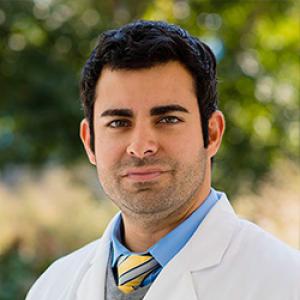
Kamrouz Ghadimi, MD – 2017
2017 DIG Research Project | “Role of Sirtuins in Platelet Aging and Perioperative Thrombocytopenia after Mechanical Circulatory Support”
Background
Dr. Kamrouz Ghadimi is an intensive care physician and cardiothoracic anesthesiologist at Duke University Medical Center with specialty board certifications from the American Board of Anesthesiology in anesthesiology and critical care medicine. He also holds a special board certification in advanced perioperative transesophageal echocardiography from the National Board of Echocardiography. Dr. Ghadimi is an active member of several national and international societies, including the International Society of Thrombosis and Hemostasis, the Society of Critical Care Medicine, the Society of Cardiovascular Anesthesiologists, and the American Heart Association’s Council on Cardiovascular Surgery and Anesthesia. He is currently the associate co-medical director of the Cardiothoracic Surgical Intensive Care Unit (ICU) at Duke University Hospital, and his clinical expertise spans across the operating room and surgical ICU settings. This expertise includes care of critically ill patients with mechanical circulatory support (MCS), such as extracorporeal membrane oxygenation (ECMO) and cardiac ventricular assist devices (VAD). He has given multiple lectures, written several peer-reviewed publications, and published numerous textbook chapters within his field. Dr.Ghadimi and his co-authors have been cited in high-impact journals, such as the New England Journal of Medicine.
Dr. Ghadimi is a native of the Maryland/Washington D.C. area, but his education and career have taken him around the country. As an undergraduate at Boston University, majoring in economics, he would travel back home during the summer months to work as a research intern at the National Institute of Health within the National Cancer Institute’s Basic Science Laboratory, as well as at the Shock Trauma Animal Laboratory at the Uniformed Services University in Bethesda, Maryland. During this formative time, he established a strong foundation in scientific research and went on to graduate from Boston University School of Medicine.. He completed his surgical internship at the University of California Irvine Medical Center in Orange, California, where he began to foster a strong interest in surgical critical care. After his internship, he pursued residency training in anesthesiology at the Allegheny Health Network in Pittsburgh, Pennsylvania and opted to pursue dual fellowship training following his extensive residency case exposure to cardiothoracic anesthesiology, supplemented by outstanding mentorship. Before joining Duke Anesthesiology, Dr. Ghadimi completed an advanced clinical and research fellowship in cardiothoracic anesthesiology and critical care medicine at the Hospital of the University of Pennsylvania in Philadelphia. During his fellowship, he was selected by faculty and peers to receive the prestigious Joel A. Kaplan, MD Award for Outstanding Fellow in Cardiothoracic Anesthesiology and Critical Care.
Research
Dr. Ghadimi’s research interests involve acquired disorders of hemostasis and thrombosis and the perioperative care of patients undergoing mechanical circulatory support and transplantation. His long-term goals are to establish new perioperative care guidelines and develop novel therapeutic strategies to prevent adverse bleeding events in recipients of MCS devices. Dr. Ghadimi is grateful to have received a DREAM Innovation Grant, which in part allows him to pursue a preclinical investigation while being embedded within two basic science laboratories with solid track records of training and mentoring junior faculty in order to pursue a future pilot clinical study of reduced platelet counts (thrombocytopenia) which commonly occur in patients who experience cardiac surgery and mechanical circulation. Low platelet counts have been associated with increased acute kidney injury, increased blood transfusion, increase complications related to bleeding, and increased mortality in patients after cardiac surgery and MCS. Dr. Ghadimi is developing adequate preclinical support for his hypothesis by using a clinically-relevant experimental model of MCS through his active participation within the Cardiovascular Systems Modeling Laboratory of Dr. Mihai Podgoreanu (Duke Anesthesiology’s chief of Cardiothoracic Anesthesia Division and a 2012 DIG recipient) and the Molecular Basis of Thrombocytopenia and Platelet Analytics Laboratory of Dr. Gowthami Arepally (Duke Department of Medicine).
The results of this research will help establish new mechanisms by which low platelet counts develop during cardiac surgery and serve as the basis for the development of new drug therapies which may help prevent this known complication. The partnership with the various laboratories will serve to optimize the bench-to-bedside understanding of the interplay between cellular aging and resilience, as well as coagulation and inflammation, in the ever-growing population of critically ill patients.